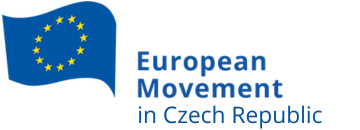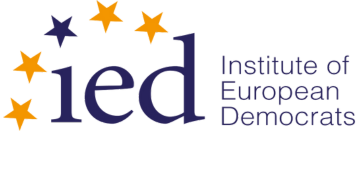Let’s focus on topics that matter to young people – especially disinformation and the environment!
This was the message of this year’s conference organized by the European Movement and its partners, held in April 2024 at the Chamber of Deputies and the Strahov Monastery. Why focus on topics important to young people? “Because they will live the longest in the world shaped by the decisions we make today. They will be the ones most affected by the present,” said MP Jan Berki, who hosted the event at the Chamber of Deputies, in his opening remarks. “At the same time, we believe it’s important to focus on people – on each and every one of us. We shouldn’t think only about the system, but also about the role each person plays in it,” he added.
Conference was organised with support of European Parliament by the European Movement in Czech Republic and the Institute of European Democrats in cooperation with the European Renaissance Institute on the occasion of the 20th anniversary of the greatest ever enlargement of the European Union.
The event was being conducted under the auspices of the Minister for European Affairs, Martin Dvořák, 1st Deputy Speaker of Chamber of Deputies, Věra Kovářová
and MP Jan Berki, member of the European Affairs Committee.
When: on Friday 12 April 2024
Where: Chamber of Deputies of the Parliament of the Czech Republic, Sněmovní 1, PRAGUE 1
and Strahov Monastery, Strahovské nádvoří 1, PRAGUE 1
The conference was simultaneously interpreted into Czech and English,
and was streamed on-line: https://videoarchiv.psp.cz/playa.php?cast=3853
"Europe for You(th)" - Programme
Chamber of Deputies
8:45 – Registration with refreshments
9:30 – Opening remarks by the patronage holders and representatives of the main organising organisations
- Jan Berki – MP, Member of the European Affairs Committee, Parliament of the Czech Republic
- Francesco Rutelli – President, Institute of European Democrats (IED), video message
- Andrzej Potocki – Vice-President, European Democratic Party
- Vladimír Špidla – President of the European Movement in the Czech Republic
- Julien Omowadi – Board Member, Young Democrats for Europe (YDE)
- Petros Fassoulas – Secretary-General, European Movement International, video message (tbc)
- Pavlína Žáková – Deputy Minister for European Affairs of the Government of the Czech Republic
- Introduction by Nikola Šrubařová, Secretary-General, European Movement in Czech Republic
10:15 – Coffee break
10:30 – 1st round table: Disinformation and how to counter it
How can equality of expression be guaranteed in the age of algorithmic control of social media? How can we regulate online communication to protect our common values without resorting to anti-democratic tools such as censorship or other ad hoc restrictions?
- Marie Heřmanová – social anthropologist, author, lecturer at the Faculty of Arts, Charles University, researcher at the Academy of Sciences of the Czech Republic
- Arnaud de Vibraye – expert on hybrid threats, EU policy and the human factor in cybersecurity, YDE
- Jakub Landovský – Permanent Representative of the Czech Republic to NATO
- Tomáš Řepa – military historian, assistant professor and lecturer at the University of Defence in Brno, lecturer at Masaryk University
- Lutjona Lula – researcher and communication proffessional, digitalization and deliberative emocracy, IED
- Petr Gongala – coordinator of the Demagog.cz project, Central European Digital Media Observatory (CEDMO)
- Moderated by Pavel Trantina, Vice-President, European Movement in Czech Republic
11:45 – Discussion
12:15 – Lunch break
13:15 – 2nd round table: Our efforts to protect the planet and their consequences
How does global warming affect citizens socially and psychologically? Climate change will require societal changes, are governments and political leaders considering it? What role does media treatment of environmental issues play in their acceptance?
- Catherine Chabaud – Member of the European Parliament (video)
- Aleš Chmelař – Czech Ambassador to the OECD, former State Secretary for European Affairs (online)
- Eva Morel – founder and chairwoman of QuotaClimat.org
- Anna Kárníková – director of Hnutí DUHA – Friends of the Earth
- Romana Jungwirth Březovská – researcher at AMO and Global Change Research Institute, Czech Academy of Sciences
- Dagmar Michalíková – Vice-President of the Living Water Association, co-ordinator of Living Landscape project
- Vladimír Špidla – President of the European Movement in the Czech Republic, historian, politician, nature photographer and enviromentalist
- Moderated by Gerrit-Jan van Otterloo, Institute of European Democrats
14:30 – Discussion
15:00 – Walking transfer to Strahov Monastery
Due to the strictly limited capacity, entry will be possible only upon presentation of a ticket, which will be obtained from the organisers during the Friday programme in the Chamber. Thank you for your understanding.
Strahov Monastery - upon approval
15:30 – Refreshments
16:00 – Debate: The role of libraries for current and future generations
Discussion on the role of libraries in the fight against misinformation, educating the public in the digital era.
- Daniel Peter Janáček – Abbot of Strahov Monastery
- Tomáš Řehák – Director of the Municipal Library in Prague
- Giorgia Petracchi – Moderator, member of Young Democrats for Europe (YDE)
17:15 – Closing remarks by Jean-Baptiste Houriez, Institute of European Democrats, invitation to a cocktail
17:30 – 19:30 – Dinner
The conference “Europe for You(th)” – Europe for You, Europe for the Young – held in Prague at the Chamber of Deputies and the Strahov Monastery on April 13, 2024, was organized by the European Movement in the Czech Republic in cooperation with the Institute of European Democrats (IED). Its aim was to address urgent issues related to disinformation, environmental protection, citizenship, and freedom of information.
In collaboration with the Young European Democrats (YED) and the European Institute Renaissance (EIRe), the event brought together a panel of experts from across the continent, including many young Czech students and public figures. In addition to MP Jan Berki, the event was also supported by the Minister for European Affairs, Martin Dvořák, and Deputy Speaker of the Chamber of Deputies, Věra Kovářová.
At the opening, Vladimír Špidla, Chairman of the European Movement in the Czech Republic, reflected on both core topics. “Nature does not negotiate with us. It’s up to us how we respond. Civilizational turning points have always been accompanied by major shifts in how we handle information. Disinformation is not about technology but about interests and the ability to work with information. It is impossible to have credible and productive dialogue in a society that is radically socially divided. And precisely because extraordinary cooperation will be needed, we must realize that this cooperation has to happen at the global level. A society that is clearly unjust cannot cooperate. That’s why it is so important that the EU has articulated a ‘just transition’ – the EU thus plays a crucial role.”
Deputy Minister for EU Affairs Pavlína Žáková then pointed to the current 20th anniversary of the Czech Republic’s accession to the EU and highlighted the benefits of membership, which today’s young people often take for granted.
The morning session of the conference dealt with the complexities of fighting disinformation in the digital age, examining strategies to support freedom of speech while protecting against online disinformation and algorithmic manipulation. Moderator Pavel Trantina, Vice President of the European Movement in the Czech Republic, emphasized that “disinformation primarily serves to spread influence. It can have economic aims, discredit opponents, polarize, or support information warfare.”
The panel discussion was opened by social anthropologist Marie Heřmanová from the Czech Academy of Sciences, who pointed out that we often overlook key aspects of disinformation – that the algorithmic effect is less significant than the interpersonal, offline effect. While this doesn’t negate the importance of regulating online platforms, especially when it comes to foreign propaganda, it is essential to address not only the symptoms but especially the causes – such as radicalization that begins before entering the online space. “Studies show that it’s not platforms that radicalize people, but rather people who radicalize platforms. The fundamental issue is societal distrust – primarily in political and media institutions. We should focus more on the process of trust breakdown, which is where conspiracy narratives take hold,” she concluded.
The following discussion emphasized the need for balanced regulation of online discourse without resorting to censorship. Experts from various fields shared insights. Arnaud de Vibraye, a cybersecurity specialist, stressed the crucial role of the human factor – algorithms are reactive. “One of the most important aspects is to begin true media education as early as possible,” he reminded the audience.
Czech Ambassador to NATO Jakub Landovský reflected on humanity’s relationship with truth. Tomáš Řepa, a lecturer at the University of Defence, discussed cyber warfare and his involvement in the Fakescape project, which engages seniors in conversations about fake news. Lutjona Lula, a researcher at the University of Tirana, focused on supporting participatory democracy. Petr Gongala, founder of the fact-checking NGO Demagog.cz, emphasized that restrictions on freedom of expression are often tied to security concerns.
In the afternoon, participants engaged in discussions on the socio-psychological impacts of global warming and the necessity of societal and governmental responses. Panelists supported public acceptance of climate change initiatives and, alongside critical analysis, highlighted the role of media in shaping environmental discourse and policy.
MEP Catherine Chabaud presented the EU’s role in climate negotiations and advocated for ocean protection and sustainable development. Aleš Chmelař, Czech Ambassador to the OECD, discussed the challenges of financing climate policies and called for a fair distribution of the costs of climate mitigation.
Eva Morelová, founder of the NGO QuotaClima, emphasized the role of media in shaping public opinion on climate change and stressed the need for better regulation of environmental information. Anna Kárníková, Director of Friends of the Earth Czech Republic (Hnutí Duha), emphasized the importance of equitable distribution of environmental transition costs and examined political tools for supporting a just transition.
Romana Jungwirth Březovská, an active participant in recent COP conferences, expressed the view that the political moment may have already been lost. However, she acknowledged that some progress had still been made in the Czech Republic through relatively well-designed programs funded by the EU and implemented via the Ministry of the Environment. Long-time activist Dagmar Michalíková noted that the best way to ensure effective action gains broad public support is to “tell the truth, genuinely deliver on past promises, show authenticity and loyalty from both NGO representatives and engaged politicians, and work with journalists who may be confused by disinformation troll centers,” among other strategies.
In conclusion, Vladimír Špidla reiterated the transformative nature of climate change and the need for proactive, fair responses.
The final evening discussion at the Strahov Monastery highlighted the role of libraries in the fight against disinformation and in supporting public education. Abbot of the Strahov Monastery Daniel Peter Janáček and Tomáš Řehák, Director of the Prague Municipal Library, complemented each other well and emphasized the essential role libraries play in spreading quality information. They stressed the importance of a personal approach and quality services for citizens, which nowadays go far beyond simply lending books and include a vital community and social function.
The “Europe for You(th)” conference provided a platform for robust discussions and offered participants valuable insights into the fight against disinformation, progress in environmental protection, and the promotion of informed citizenship. At the same time, it encouraged young participants to actively engage in addressing these pressing challenges.
Registration CLOSED
Registration is closed, capacity is full. If you would like to receive a link to watch the live stream, please fill out the form below.




